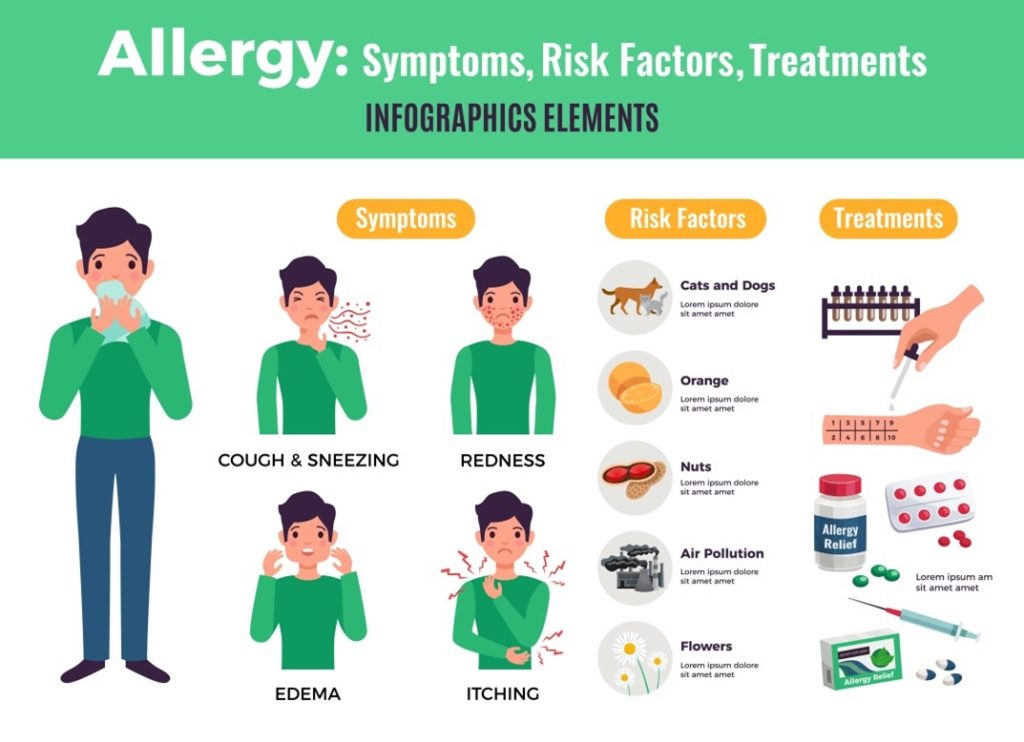Blog Details


If you wake up with frequent sneezes and itchy nose in the morning or suffer from a runny nose, itchy eyes and nasal congestion very often, then there are higher chances that you are suffering from allergic rhinitis or hay fever.
Nasal allergies or allergic rhinitis is very common and affects many people across the world. As per statistics, approximately 10-30% of the world’s population suffers from allergic rhinitis. Some people have allergic rhinitis symptoms only when the season changes, while some suffer from it year around.
Allergic rhinitis symptoms can be mild and respond well to anti-allergic medications. But in some cases, these symptoms may become severe and cause troubled sleeping and interfere with day-to-day activities. What is allergic rhinitis? What are the causes, symptoms and types of allergic rhinitis? How can you prevent and treat allergic rhinitis symptoms? Read the post to know more!
Allergic rhinitis is an inflammatory condition of nasal mucosa caused by exposure to certain allergens such as dust mites, pollens and animal dander. Allergic rhinitis symptoms appear due to overreaction of the immune system to certain stimuli or allergens which are typically harmless and produce no symptoms in others.
Exposure to allergens causes an overreaction of the immune system and produces an allergic reaction. As a result, the body releases certain chemicals (histamine) from mast cells. Releasing histamine from mast cells caused various allergic symptoms like a runny nose, itchy eyes and nose and increased nasal congestion.
Allergic rhinitis can be caused by indoor or outdoor allergens. In some cases, irritants like strong fumes and smoke also produce allergic rhinitis symptoms.
Here is a list of some common allergens that trigger allergic rhinitis symptoms.
As per recent ARIA (allergic rhinitis and its impact on asthma) guidelines, allergic rhinitis can be classified in two ways. One is based on the severity of symptoms and the other is based on the duration of symptoms.
Here are some common symptoms of allergic rhinitis.

Diagnosis of allergic rhinitis is usually based on clinical symptoms and clinical examination. The doctor may perform a blood test to measure the level of IgE antibodies in the blood.
In some cases, doctors can also perform skin allergy test (skin prick test) which helps in identifying specific allergens which are responsible for causing allergy symptoms.
Avoidance of allergens is one of the best ways to prevent allergic rhinitis symptoms. However, it is not possible all the time. As a preventive measure, you can take the following steps to reduce exposure to common allergens and prevent allergic rhinitis symptoms.
Along with these preventive measures, it is equally important to follow a healthy lifestyle which includes eating a healthy diet and regular exercise. Healthy lifestyle measures keep your immune system strong and reduce the occurrence of allergy symptoms.
Treatment of allergic rhinitis depends upon the severity of symptoms. Anti-allergic medication is available in various forms like tablets, nasal sprays and syrup. Your doctor can prescribe the best medication for you as per your existing symptoms.
For mild cases, you can use over-the-counter anti-allergy (antihistamine) tablets. These medications offer quick relief in allergic symptoms but some of these may cause drowsiness, so avoid using them while driving a vehicle or operating machinery.
Decongestants (nasal spray and liquid), corticosteroid spray and tablets and leukotriene inhibitors are some of the other commonly used medications for treating allergic rhinitis symptoms.
For serious cases, your doctor may recommend immune therapy which involves injecting a small number of specific allergens for treating allergic symptoms.
© 2023 Healthy Lungs.